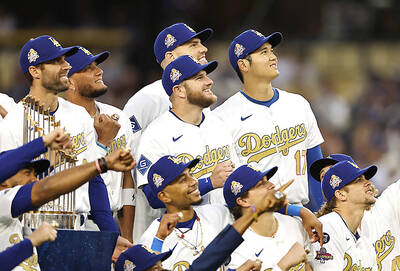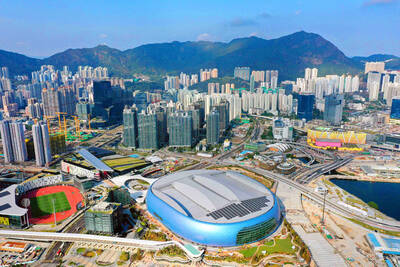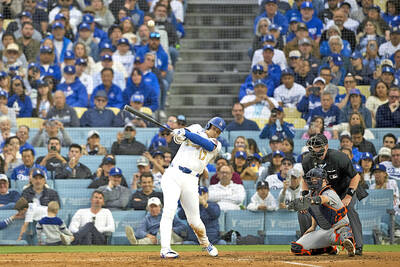A debate over the soul of soccer is raging in FIFA World Cup holders Argentina, pitting defenders of the social role of the beautiful game against the government of libertarian Argentine President Javier Milei, who wants to turn clubs into for-profit companies.
Argentina, which gave the world Diego Maradona and Lionel Messi, is home to some of the world’s most devoted soccer fans — a fact attributed by supporters like Gabriel Nicosia to the clubs’ community outreach.
Nicosia is a lifelong supporter of San Lorenzo, a more than 100-year-old first division club based in the working-class Buenos Aires neighborhood of Boedo where he grew up.

Photo: AP
Several times a week he crosses town to have a coffee or work out in the club of which Argentina-born Pope Francis is a fan.
“When I come here I meet my childhood friends. It’s a fundamental pillar of everyday life,” said the 50-year-old accountant, one of 80,000 members of a club whose stadium can only seat 48,000.
Membership can be acquired for a modest 22,000 pesos (US$22) a month and comes with a vote on the club’s management and tickets to local games.
The club’s role as the glue that binds the community is underscored by the 300 scholarships it awards each year to young people from a nearby shantytown.
The recipients get to indulge their own dreams of fame and fortune by hanging out close to the training grounds of millionaire players. Advocates of the not-for-profit model fear that this outreach could become a thing of the past if Milei manages to impose his free-marketeer vision on the clubs.
The president, an ardent defender of deregulation in all spheres of society, wants to change the statutes of the country’s several thousand soccer clubs to allow them to become privately owned for-profit companies.
During campaigning for president last year, Milei cited Buenos Aires’ famous Boca Juniors, of which he is a fan, saying: “No one cares who the owner is if you beat [arch-rivals] River Plate 5-0 and you win the [FIFA] Club World Cup.”
The alternative was to “live with the misery that is Argentine football, which is deteriorating by the day,” he said.
However, many Argentine clubs are firmly opposed to any change of ownership.
“Our club belongs to its people, its members and its partners who make it greater each day,” Boca Juniors said.
Argentine Football Association (AFA) president Claudio Tapia, who has one FIFA World Cup (2022) and two Copa America (2021, 2024) titles under his belt, has also made no secret of his opposition to the reforms.
It’s “not our football model,” Tapia, whose re-election to another four-year term last month was seen as a rebuke to Milei’s reform, told an AFA assembly in August.
The president, a self-described “anarcho-capitalist,” has forged ahead regardless.
In August, his government ordered the AFA to amend its statutes to allow for-profit clubs to join.
The decree was suspended by a court in September pending the outcome of a legal challenge by the AFA.
In Latin America, the pressure on clubs to open up to private investors is not unique to Argentina.
In 2021, Brazil changed its laws to allow for-profit clubs and Argentina’s neighbor Uruguay has also adopted the model.
Some clubs see outside investment as a way to grow, attract new talent and ensure their long-term viability.
Membership fees “are not enough” to cover a club’s costs, San Lorenzo director Martin Cigna said, adding that without TV rights and transfer fees, his club would be running “a million-dollar deficit.”
Former Argentina international Juan Sebastian Veron, who is president of another venerable club, Estudiantes, said they were preparing for a change to a “hybrid” model that would combine a “social” role with private funding.
The ball is still up in the air but tensions are rising between the AFA and Milei.
The president has vowed to investigate “irregularities” at the AFA, whose leadership he has compared to that of authoritarian Venezuelan President Nicolas Maduro.
However, for the moment, soccer fans are on the AFA’s side.
A poll carried out by sports think tank Tactica showed that 60.2 percent of Argentines interested in the sport opposed a change in the clubs’ ownership.

Shohei Ohtani and Clayton Kershaw on Friday joined their Los Angeles Dodgers teammates in sticking their fists out to show off their glittering World Series rings at a ceremony. “There’s just a lot of excitement, probably more than I can ever recall with the Dodger fan base and our players,” manager Dave Roberts said before Los Angeles rallied to beat the Detroit Tigers 8-5 in 10 innings. “What a way to cap off the first two days of celebrations,” Roberts said afterward. “By far the best opening week I’ve ever experienced. I just couldn’t have scripted it any better.” A choir in the

After fleeing Sudan when civil war erupted, Al-Hilal captain Mohamed Abdelrahman and his teammates have defied the odds to reach the CAF Champions League quarter-finals. They are today to face title-holders Al-Ahly of Egypt in Cairo, with the return match in the Mauritanian capital, Nouakchott, on Tuesday next week. Al-Hilal and biggest domestic rivals Al-Merrikh relocated to Mauritania after a power struggle broke out in April 2023 between the Sudanese army and a paramilitary force. The civil war has claimed tens of thousands of lives and displaced more than 12 million people, according to the UN. The Democratic Republic of the Congo-born Al-Hilal

The famously raucous Hong Kong Sevens are to start today in a big test for a shiny new stadium at the heart of a major US$3.85 billion sports park in the territory. Officials are keeping their fingers crossed that the premier event in Hong Kong’s sporting and social calendar goes off without a hitch at the 50,000-seat Kai Tak Stadium. They hope to entice major European soccer teams to visit in the next few months, with reports in December last year saying that Liverpool were in talks about a pre-season tour. Coldplay are to perform there next month, all part of Hong Kong’s

Shohei Ohtani, Teoscar Hernandez and Tommy Edman on Thursday smashed home runs to give the reigning World Series champions the Los Angeles Dodgers a 5-4 victory over Detroit on the MLB’s opening day in the US. The Dodgers, who won two season-opening games in Tokyo last week, raised their championship banner on a day when 28 clubs launched the season in the US. Dodgers manager Dave Roberts shuffled his batting lineup with all four leadoff hitters finally healthy as Ohtani was followed by Mookie Betts, then Hernandez and Freddie Freeman in the cleanup spot, switching places with Hernandez. “There’s a Teoscar tax to